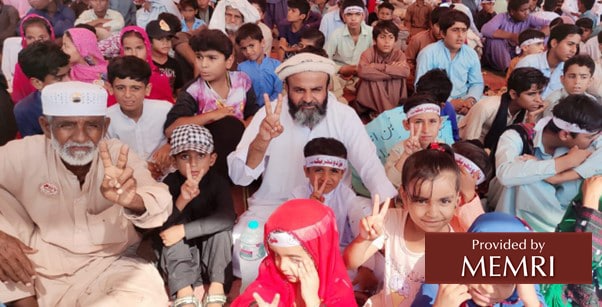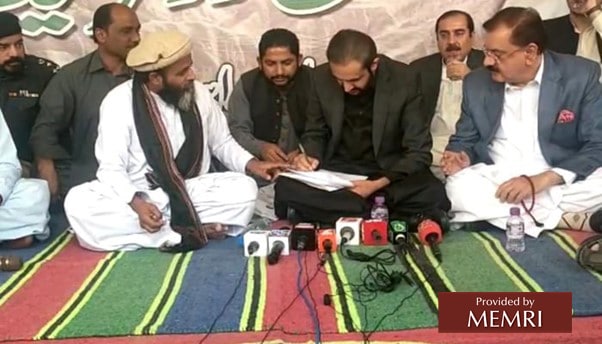In the coastal town of Gwadar, where China has built a strategic port, protests led by Maulana Hidayatur Rahman Baloch, the secretary general of Jamaat-e-Islami for Baluchistan province, have broken out again. The protesters demand jobs, the removal of the high number of Pakistani military checkpoints, the stopping of illegal Chinese commercial trawlers and the protection of fishing rights for locals, the opening of transit points on Pakistan-Iran border for trade, and so on.
Baluchistan is territorially the largest province of Pakistan. It is rich in natural resources and sparsely populated. In recent decades, the people of Baluchistan have alleged that non-Baluchis, especially those from Punjab, rule over the province and the benefits of economic developments do not reach the locals. As a result, the province is home to a low-intensity but persistent insurgency.
The Pakistani government, especially the military and its intelligence agencies, has picked up Baluchistan's educated people and civil society activists, who often disappear without a trace. Pakistani military ruler General Pervez Musharraf aggravated the issue further by ordering the assassination in August 2006 of Nawab Akbar Bugti, a widely respected Baluchi leader who had served as the province's governor and chief minister as well as the defense minister of Pakistan.

Maulana Hidayatur Rehman Baloch (center), the leader of the protests.
In November-December 2021 thousands of ordinary Baluchi women turned out on Gwadar's coast to protests as well. The placards in their hands read: "Give rights to Gwadar"; "We are Baloch, We have self-respect."[1] The 32-day protests in 2021 ended after Baluchistan Chief Minister Mir Abdul Qudoos Bizenjo signed an agreement with Maulana Hidayatur Rehman, the leader of the Gwadar protests, accepting most of the demands. At the time, Bizenjo had said that all the protesters' demands "are legitimate."[2]
While Pakistani newspapers usually shy away from writing about Baluchis' rights to avoid displeasing the powerful military, occasionally some editorials and comment pieces do come up. Following are excerpts from two editorials on the issue, one in Roznama Jasarat, an Urdu newspaper belonging to Jamaat-e-Islami Pakistan, and the other in Dawn, a liberal English daily.
"In Recent Decades, The Coastline Of Baluchistan Has Gained National And International Importance Due To The [Chinese-Built] Port Of Gwadar And CPEC [The China-Pakistan Economic Corridor]"
Following is the text of the Roznama Jasarat editorial, as translated from Urdu:[3]
"Baluchistan has been smouldering for a long time. The feeling of deprivation has been present in the people of Baluchistan since day one, and has been increasing day by day. Using repressive state power, former military dictator General (retired) Pervez Musharraf is responsible for bringing the situation of Baluchistan to its present point, who had killed Sardar Akbar Bugti, a major leader of Baluchistan, in a missile attack. It seems that our rulers have not yet learned their lesson.
"In recent decades, the coastline of Baluchistan has gained national and international importance due to the [Chinese-built] port of Gwadar and CPEC [the China-Pakistan Economic Corridor]. Baluchistan was given the hope of economic prosperity after CPEC and [the discovery of] mineral deposits. But the hardships of the residents of Balochistan, especially Gwadar, increased. The people of Gwadar have been fighting a peaceful political struggle for a long time to solve their problems.

"This struggle by force too has been adopted. The leader of the Give Rights to Gwadar Movement and Secretary General of Jamaat-e-Islami Baluchistan Maulana Hidayatur Rahman Baloch has released a video message in which it is said that the [military] operation has been going on in Gwadar for nine days.
"Gwadar has been under siege since December 26, leaders and officials have been made to disappear, activists and many others have been tortured and arrested. They have appealed to the media, human rights organizations, lawyers and people who love humanity to support them in this hour of difficulty. The Give Rights to Gwadar Movement is a movement of peaceful political activists. What sort of message does the ending of a peaceful political movement by force send to our own citizens?
"The demands of the citizens of Gwadar are right. The provincial government had entered into an agreement with them. The new wave of protests is for the implementation of the agreement. The scenario in Gwadar shows that the powerful ruling classes are not ready to tolerate political struggle either. In the historical context of Balochistan, the responsibility of media and political forces has increased to stand behind the deprived and oppressed people of their homeland. It should be remembered that no government can fight against its own nation."
"[The Protesters'] Demands Are Justified, And Reflect The Deeper Malaise Affecting Baluchistan, As Many Of The Province's People Feel They Are Not Getting The Fruit Of 'Development' That Projects Such As CPEC And Others Are Supposed To Bring"
Following are excerpts from the Dawn editorial:[4]
"Events seem to be repeating themselves in Gwadar, as supporters of the of the Give Rights to Gwadar Movement, led by Jamaat-i-Islami's Maulana Hidayatur Rahman Baloch, have been protesting in the port city for two months or so, mirroring last year's massive demonstrations.
 ]
]
In December 2021: Baluchistan Chief Minister Mir Abdul Qudoos Bizenjo (center) signs a deal, Maulana Hidayatur Rehman, the leader of protesters, in Gwadar
"However, matters turned ugly on Monday following a strike call as police and the protesters faced off. The law enforcers resorted to tear-gassing demonstrators as a mob tried to attack a police station, resulting in several arrests. The Baluchistan home minister says the protesters were trying to block the port and police had 'no option' but to resort to forceful measures.
"The Give Rights to Gwadar Movement has been staging protests for a number of demands, including the banning of illegal trawlers in Baluchistan's waters, a reduction of security checkpoints, as well as the liberalization of trade with neighboring Iran. The violence erupted after negotiations between officials and Give Rights to Gwadar Movement representatives broke down.
"While violence cannot be condoned, the state needs to handle this issue with care. The fact is that many of the Give Rights to Gwadar Movement's demands are justified, and reflect the deeper malaise affecting Baluchistan, as many of the province's people feel they are not getting the fruit of 'development' that projects such as CPEC and others are supposed to bring.
"While critics say the Give Rights to Gwadar Movement chief has political aspirations, the fact is that he has struck a chord with the people of Makran, who feel the establishment-backed politicians, as well as the nationalists, have failed to deliver. Instead of cracking down on the protesters, the state needs to resolve the impasse and address the people's genuine problems and continue the dialogue process.
"Instead of more promises, the people of Baluchistan need action on the ground, so that they become the principal beneficiaries of development in their own province. Considering decades of neglect, it will take time to address the people's grievances, but the government needs to deal with the issues with compassion and understanding, rather than resorting to the use of force."
[1] MEMRI Daily Brief No. 343, A Surging Wave Of Protests In Pakistan's Port City Of Gwadar Could Sink China's Global Ambitions To Succeed U.S. As Next Superpower, December 13, 2021
[2] The News International (Pakistan), December 16, 2021.
[3] Roznama Jasarat (Pakistan), January 5, 2023.
[4] Dawn (Pakistan), December 28, 2022.




